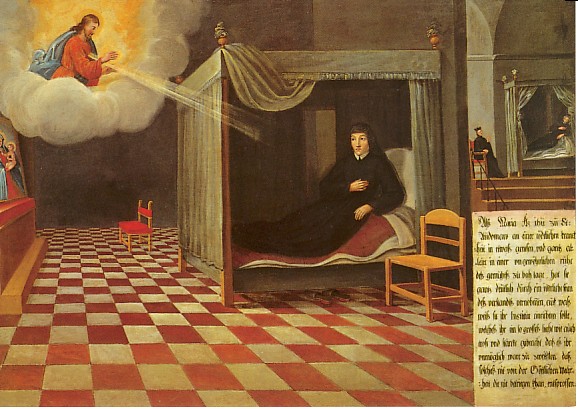‘Take the same of the Society’ – 1611

By 1611 the school in Saint Omer was established, and more young women were coming to join the group of companions, but Mary Ward was still not clear about the form the religious life of her community should take. Various ‘spiritual and holy men’ made suggestions of approved Rules that they might adopt, but none of them seemed to be ‘what God wanted to be done’. During this year she became seriously ill, and it was while she was recovering that, lying in bed and ‘in extraordinary peace of mind’ she heard the words, ‘not by sound of voice, but intellectually understood, ‘Take the same of the Society.’
This was not a ‘vision’ in any way, but rather an invitation from God to use something from her own experience, though a ‘resurrection moment’, certainly, because it was to be life-changing. She says, in the letter to Nuncio Albergati from which the quotations are taken, ‘These few words gave so much light in that particular Institute, so much comfort and strength, and so changed my whole soul, that it was impossible for me to doubt that they came from him whose words are works’. In an earlier letter to Fr. John Gerard, a personal friend and a Jesuit, she had written ‘These are the words whose worth cannot be valued, nor the good they contain too dearly bought: these gave sight where there was none, made known what God would have done, gave strength to suffer what since hath happened, assurance of what is wished for in time to come. And if ever I be worthy to do anything more about the Institute, hither I must come to draw.’ But God was inviting her to see the value and the relevance of something she already knew. During all her formative years in England she had lived under the influence of Jesuit priests, she had learned about discernment, indifference, examen, retreats, meditation; and she had seen something of Ignatian apostolic ministry. What she was now being asked to do was to see how women, as well as men, could live this life: to see how in practice, as she wrote to Albergati, ‘we were to take the same both in matter and manner, that only excepted which God by diversity of sex hath prohibited.’
For the rest of her life she was never to doubt that the Jesuit way was God’s will for her, and for all who would ever follow her. Perhaps we have had some similar insight from God, enabling us to see past experience in a new, dynamic and life-changing way, to use it creatively in a radically different future – and to help others to name and use such moments?
Sr. Patricia Harriss CJ









